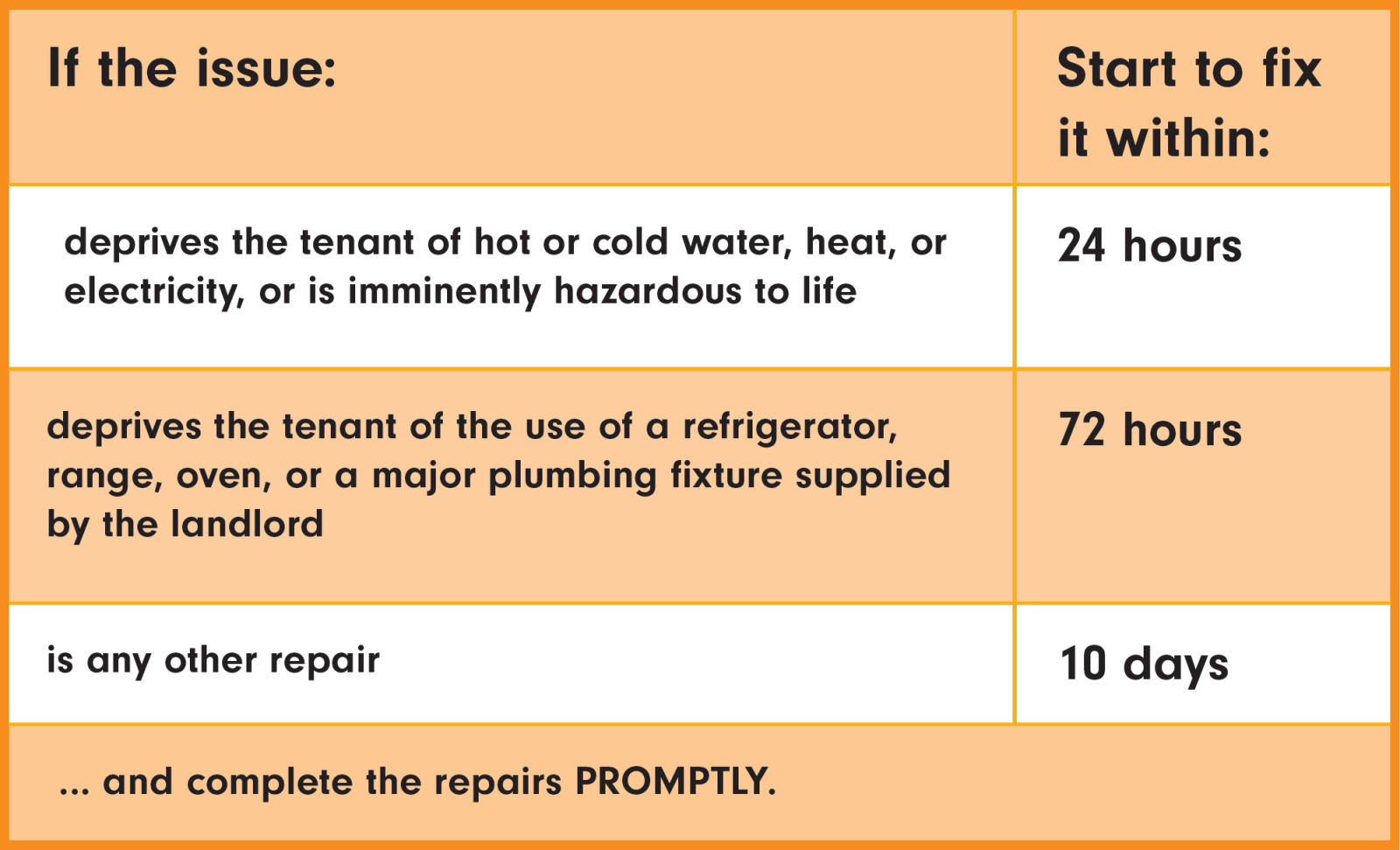Seasonal Maintenance & Repairs

DID YOU KNOW…
Under Washington State law, the responsibility of maintaining property condition is shared between the housing provider and residents. The housing provider is responsible for maintaining the property by repairing damage caused by regular wear and tear and responding quickly to all tenant repair requests. The tenant is responsible for the cost of damage beyond regular wear and tear. Understanding and communicating maintenance and repair responsibilities can help prevent disputes.
Maintain Property Condition
Keeping rental property in good condition as required under RCW 59.18.060, requires a proactive approach. It is important to plan for major repairs based on the age of the building and its features. For example, if the roof is 20 years old, the housing provider will need funds to replace it soon, before leaks begin causing damage. See the International Association of Certified Home Inspectors Life Expectancy Chart for Home as a reference, keeping in mind that in rental housing, interior surfaces generally have a much shorter life. Also, it is common practice to paint and re-carpet between tenancies.
Find unexpected maintenance and repair issues by conducting property inspections at least once a year. See Routine Inspections for more details.
Try to make major repairs that will place a significant burden on the tenant between tenancies. If not possible, consider making a concession such as reduced rent while the work is being done.
Ensure that Residents Understand their Responsibilities
In addition to regular cleaning and taking out trash, common household repairs such as unclogging drains, replacing lightbulbs, or smoke detector batteries are usually the responsibility of the tenant (RCW 59.18.130). Provide clear instructions in writing and review at move-in. Residents should know how to shut off water in an emergency or reset circuit breakers if the panel is accessible to them. See Setting Property Care Policies for more information.
Respond Quickly to Tenant Repair Requests
Washington legal code, RCW 59.18.070, requires that housing providers respond to tenant repair requests and begin to fix the problem as soon as possible, but not later than the following time periods, except where circumstances are beyond their control.

It is critical to stay in contact with the tenant while completing repairs. Regardless of obstacles, the housing provider must continue to actively work on the issue until the problem is resolved.
Document the steps you are taking from the moment you receive a repair request. Keep a running dialog, or “communication contact” sheet, of all your steps and continually communicate to the tenant where in the process you are. The clock starts ticking once you are informed of the issue; the law states that you must “commence” or begin the repair process within 10 or fewer days, depending on the severity of the issue. The listed number of days is not a completion time limit, but the repair must be completed promptly.
Tenants and housing providers are often reasonably frustrated when the timeline for fixing something is held up for reasons beyond their control. From the tenant’s perspective, they are paying for something they are not able to use. If an appliance requires back-ordered parts or there is a warranty issue, these delays generally make the tenant feel entitled to compensation. When considering whether to offer a “courtesy goodwill” compensation, make sure you would treat all tenants the same and consider what you would want in their shoes. Balance this against your operating costs to determine what you can afford.
If the housing provider fails to make repairs in a timely manner, they may receive a court order to pay damages to the tenant. The tenant may also have the right to end the tenancy, make repairs and deduct the cost from rent, or, in extreme cases, pay rent into escrow until substandard conditions are repaired (RCW 59.18.090, .100, .110, .115).
Invoice Tenants for their Damages and Pay for Other Repairs
Unless a tenant causes the damage by accident, negligence or improper use, the housing provider must bear the cost of the repair (RCW 59.18.060). If the tenant is responsible, simply make the repair and then send them an invoice to cover the cost. Never deduct money from a security deposit during tenancy. Make sure to go to our Support Center and find the article Determining Responsibility for Repairs for more details!
This article was written and edited by RHAWA representatives and is intended for the use of RHAWA members only. Copyrighted members-only materials may not be further disseminated. Formal legal advice and review are recommended prior to the selection and use of this information. RHAWA does not represent your selection or execution of this information as appropriate for your specific circumstance. The material contained and represented herein, although obtained from reliable sources, is not considered legal advice or to be used as a substitution for legal counsel.

